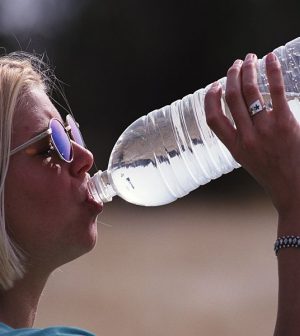- Could Your Grocery Store Meat Be Causing Recurring UTIs?
- Are You Making This Expensive Thermostat Error This Winter?
- Recognizing the Signs of Hypothyroidism
- 10 Strategies to Overcome Insomnia
- Could Artificial Sweeteners Be Aging the Brain Faster?
- Techniques for Soothing Your Nervous System
- Does the Water in Your House Smell Funny? Here’s Why
- Can a Daily Dose of Apple Cider Vinegar Actually Aid Weight Loss?
- 6 Health Beverages That Can Actually Spike Your Blood Sugar
- Treatment Options for Social Anxiety Disorder
Easy Ways to Rev Up Your Metabolism and Burn Calories

Your metabolism rate determines how fast you burn calories, and that can influence how fast you lose weight — and how easily you can gain it.
After age 25, metabolism naturally slows by 5 percent every decade. So if you eat as much in your 40s as you did in your 20s, you’re going to add extra pounds — especially if you exercise less and lose muscle. In addition to weight training to maintain muscle, these tips from the American Council on Exercise can help.
Stick to well-spaced meals at the same times each day. This lets your body know to expect fuel at regular intervals and prevents it from conserving calories and adding to fat stores.
Calorie cutting is important if you need to lose weight, but reducing your intake to starvation levels also puts your body in conservation mode, slowing down metabolism. So rather than speeding up weight loss, starvation ultimately slows it. And that’s why it’s so easy to regain lost weight when you start eating normally: Your metabolism tends to stay slow.
Dehydration can lead to a 2 percent drop in the number of calories burned, so drink at least 8 glasses of water throughout each day, and even more when you sweat a lot.
Watch the alcohol. Besides adding empty calories to your diet, processing alcohol diverts the liver from burning fat.
Also consider milk and other dairy choices for their calcium, a mineral involved in fat metabolism. Dairy also delivers whey and casein — proteins that help build and preserve muscle. Remember that the more muscle you have, the more calories it takes to maintain it.
Finally, keep the hormones that regulate hunger and fullness on an even keel by getting enough sleep — at least 7 hours a night. Otherwise, you might find yourself craving sugary, fatty and starchy foods. Plus if you’re sleep-deprived on a regular basis, your body may not burn calories efficiently.
More information
The American Council on Exercise has more on these and other tips to keep metabolism humming.
Source: HealthDay
Copyright © 2026 HealthDay. All rights reserved.










